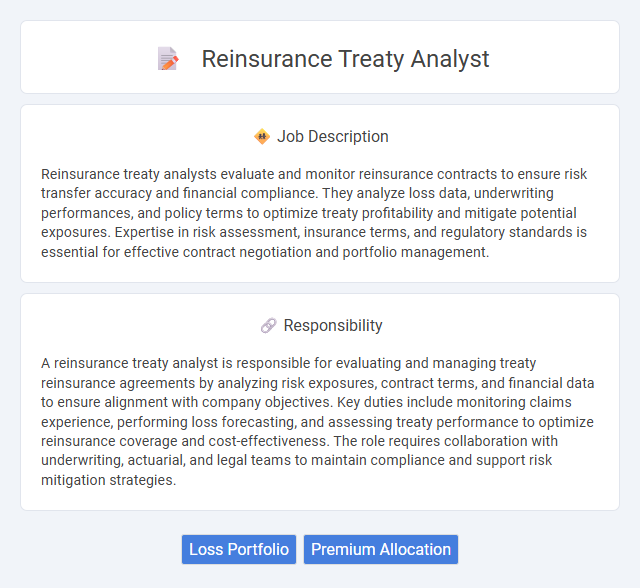
Reinsurance treaty analysts evaluate and monitor reinsurance contracts to ensure risk transfer accuracy and financial compliance. They analyze loss data, underwriting performances, and policy terms to optimize treaty profitability and mitigate potential exposures. Expertise in risk assessment, insurance terms, and regulatory standards is essential for effective contract negotiation and portfolio management.
Individuals with strong analytical skills, attention to detail, and an interest in risk assessment are likely to be suitable for a reinsurance treaty analyst role. Those who enjoy working with complex financial data and possess effective communication abilities might find this position a good fit. Candidates preferring routine tasks without much analytical challenge may face difficulties adapting to the dynamic and detail-oriented nature of this job.
Qualification
A Reinsurance Treaty Analyst typically requires a strong background in actuarial science, finance, or risk management, often supported by a bachelor's degree in these fields. Proficiency in data analysis tools, insurance software, and advanced Excel skills are essential for evaluating treaty terms and assessing risk exposure. Strong analytical abilities, attention to detail, and knowledge of reinsurance markets and regulations further enhance effectiveness in reviewing and negotiating reinsurance contracts.
Responsibility
A reinsurance treaty analyst is responsible for evaluating and managing treaty reinsurance agreements by analyzing risk exposures, contract terms, and financial data to ensure alignment with company objectives. Key duties include monitoring claims experience, performing loss forecasting, and assessing treaty performance to optimize reinsurance coverage and cost-effectiveness. The role requires collaboration with underwriting, actuarial, and legal teams to maintain compliance and support risk mitigation strategies.
Benefit
A Reinsurance Treaty Analyst likely benefits from enhanced risk management skills by deeply analyzing treaty agreements and evaluating exposure probabilities. They probably gain valuable expertise in financial modeling and regulatory compliance, contributing to more informed decision-making within insurance firms. This role may also offer opportunities for career advancement due to the specialized knowledge acquired in managing complex reinsurance structures.
Challenge
A reinsurance treaty analyst likely faces the challenge of accurately assessing complex risk portfolios to ensure adequate coverage and profitability. The role probably demands a deep understanding of insurance contracts and market trends to anticipate potential losses. Navigating regulatory requirements and aligning with underwriting strategies may also present ongoing difficulties.
Career Advancement
Reinsurance treaty analysts play a crucial role in assessing complex risk portfolios and managing contract terms, which sharpens their expertise in risk assessment and financial analysis. Mastery in data interpretation and regulatory compliance equips analysts for advancement into senior underwriting, actuarial, or risk management roles. Developing strong negotiation skills and industry relationships further enhances opportunities for leadership positions within insurance and reinsurance companies.
Key Terms
Loss Portfolio
A Reinsurance Treaty Analyst specializing in Loss Portfolio focuses on evaluating and managing reinsurance agreements related to prior loss exposures. This role involves detailed analysis of historical claims data, assessing loss reserves, and quantifying potential liabilities under treaty terms to optimize risk transfer and financial outcomes. Proficiency in actuarial techniques and knowledge of reinsurance contract language is essential to accurately forecast loss development and support underwriting decisions.
Premium Allocation
A Reinsurance Treaty Analyst specializing in Premium Allocation evaluates and allocates premiums to ensure accurate financial reporting and risk assessment in reinsurance contracts. They analyze treaty terms and loss data to distribute premiums appropriately across different coverage layers and cedents. Expertise in underwriting guidelines and actuarial principles is essential for optimizing premium allocation and supporting profitable treaty management.
 kuljobs.com
kuljobs.com